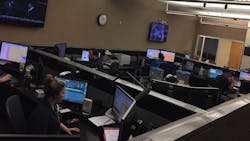Staff Shortage Taxing AL County's 9-1-1 Dispatchers
High stress, low pay and a tight job market have the Morgan County 9-1-1 communications center facing staff shortages that are putting its 9-1-1 dispatchers in an even more stressful work environment, the local director said.
"What keeps me up at night is when we're short-staffed, the dispatchers are on mandatory overtime and tired. When you get tired, mistakes can happen," Director Jeanie Pharis said. "We have to cover when people are out sick and on vacation. We have to answer the calls; many times it's a life-or-death situation."
Pharis said she recently filled four full-time and two part-time dispatcher positions, and she has two more full-time openings to reach a full staff of 29.
"Working 12-hour shifts, mandatory overtime and it being mentally draining, this job will change you," she said.
She said she and five other administrators fill in as dispatchers when personnel numbers are low.
She said staffing was not a major problem last year despite the pandemic, but she's struggled to retain and hire workers over the last few months.
Pharis said two dispatchers recently left to stay home with family.
"People find this type of job with a new family challenging. It takes a toll," she said. Others leave for jobs of equal or more pay, less stress and better hours, she said.
In Morgan County, first-day, untrained dispatchers are paid $13.76 an hour. Once fully trained, they begin at $15.04 an hour.
In 2019, Pharis said, she would typically receive 30 to 40 applications for a vacant position. Those numbers are now down to 10 to 12 applications per vacancy.
She said the job is not for everyone and the learning curve is 90 to 120 days to fully train a dispatcher.
"When we look at an applicant, we let them sit with a dispatcher for a couple of hours to see if this is the type of work they want to do," she said. "It's not for everybody. People come in and say they want to help their fellow man, but may not want the job once they see what goes on with the calls coming in."
She said 9-1-1 calls are an "emotional rollercoaster" for dispatchers.
"It's hard to take a call when somebody is in a burning house and the dispatcher knows help will not get to them in time," she said. "And then the next call is somebody complaining because their neighbor is cutting their grass."
She compared a dispatcher's job to reading a book, but the last chapter has been ripped out.
"You get a call, but you don't know how it ended," she said. "Firefighters and police, their final chapter in the book was not ripped out. ... All of these jobs are quite stressful."
Pharis wants to see all dispatchers recognized as first responders and receive benefits equal to other first responders, including early retirement options and mental health assistance.
"There are some first-responder bills and laws in some states, but Alabama has not made it there," she said.
On the national level, the 9-1-1 Saves Act hasn't passed but has been debated in both the House and Senate. The act would recognize 911 dispatchers as first responders, although it would be up to states or local 911 boards to change dispatchers' benefits and retirement plans to match those of conventional first responders.
State Rep. Proncey Robertson, R- Mount Hope, said the state Legislature has had discussions about defining 9-1-1 dispatchers as first responders, but there hasn't been a comprehensive bill addressing it. He said there are plenty of moving parts, including financing the action if legislation mandated improved wages or benefits, which may have kept any measure from passing.
"Dispatchers face the same kind of stress and burden as fire and police," said Robertson, who is a retired Decatur police officer. "We need to look at it. It's a great idea, but how do we pay for it? That's where the pushback will be. The municipalities and counties will have to pay the additional costs. Maybe we can have some sort of phase-in period to mitigate the cost. That would help so they're not paying everything at one time."
Morgan 9-1-1 previously received $4.35 per call from the 34 agencies it serves, but that changed last year when the 9-1-1 board voted to charge a flat rate of what each agency paid the previous year plus 3%.
"Our costs go up," Pharis said. "We hope to stabilize the charges so budgets are easier to plan. The per call charge is so volatile."
As the top three responders, Decatur is paying $443,817 this fiscal year for calls dispatched to the Decatur Police Department, the county is paying $194,611 for Morgan County Sheriff's Office calls and Hartselle is paying $84,201 for calls involving the Hartselle Police Department, according to 9-1-1 financial records.
"It is about $875,000 from the 34 agencies," Pharis said about the dispatcher fees. Another $2.52 million comes from landline and wireless phone service customers. Including smaller income streams, the 911 center's revenue this fiscal year is projected to be about $3.6 million, she said.
She knows the worker shortage is not limited to her profession or to the Morgan County area. "Shortage of 9-1-1 workers is a problem in the country. Everyone is having a hard time hiring," she said.
According to the National Emergency Number Association, there are more than 6,100 emergency call centers across the country. Those centers handle more than 200 million 9-1-1 calls each year.
___
(c)2021 The Decatur Daily (Decatur, Ala.)
Visit The Decatur Daily (Decatur, Ala.) at www.decaturdaily.com
Distributed by Tribune Content Agency, LLC.
